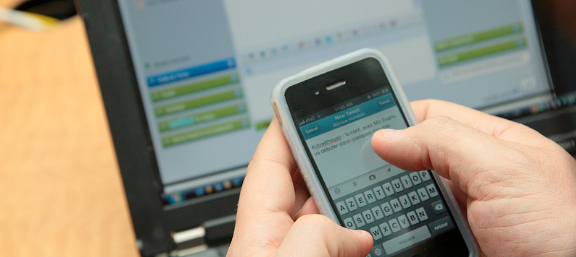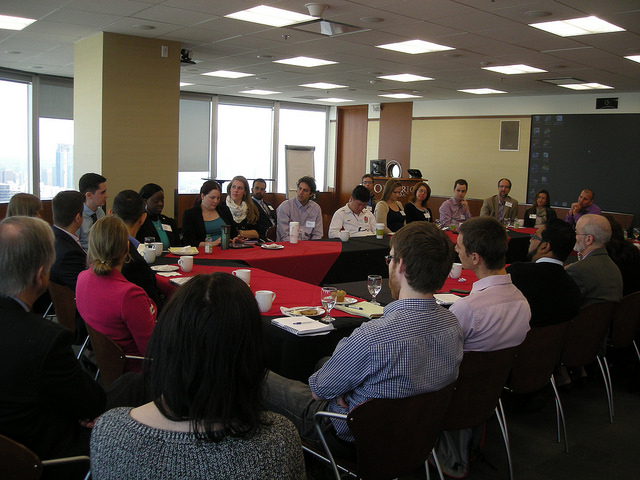Does ICT improve or hinder M&E?
Technology allows us to reach remote communities and has the potential to more efficiently collect and disseminate data. But, how is it being used in the field and what are the challenges? Those were some of the questions explored at the Ottawa Tech Salon in early June.
In disaster response situations, ICT has been helpful in collecting and monitoring real-time data through crowdsourcing in many situations including the Tsunami, Haiti and the Pakistan floods.
But in regular programme-related M&E, how is ICT used, what are its limitations and does it help?
Ostensibly, M&E is for the purpose of improving an intervention - to learn by experimentation and analyze what’s not working in order to change inputs as needed.
In reality though, M&E is too often viewed by governments, donors and implementation organizations more like a final exam: either the project passes or fails according to defined performance indicators.
Engagement of end-users
Technology can help to engage more stakeholders in the ongoing M&E process, making it more meaningful. Collecting and measuring data using technology can accelerate the rate at which results can feed directly into the M&E cycle. Using mobiles to collect data, conducting surveys to disseminating results, sometimes through 1-minute taped messages sent to survey respondents to provide results, can be useful to engage more clients and stakeholders.
Access to highly sensitive information
Technology can also allow for easier collection of sensitive materials. An Egyptian study into sexual harassment revealed that the problem wasn’t only concentrated in cities and against women, for instance. Users could rely upon anonymity and respondents were aware that the results would be used to improve programmes.
Because technology allows data to be shared so quickly, it’s important that consideration is given regarding whom to share it with and when. For instance, when results are not what was expected, governments are sometimes displeased. This can have unexpected impacts on both relationships and programming. One organization working in Africa lets beneficiaries decide how to share with government and who to share it with - so that, for instance, an organization could disseminate information through a UN body allowing the organization to remain anonymous.
Sometimes, it’s a matter of the government determining the best way to share data with the populace. In Rwanda, Thailand and the Philippines, governments have provided a platform to let people to access the data themselves.
Speed and ?
Technology has been used to more quickly collect certain types of data and to disseminate results faster. Taking greater advantage of what technology could offer to the M&E process will require new connections to be made within systems and organizations. It’s going to be important for more organizations to deepen connections between IT and the programme areas of an intervention. The techie jargon needs to be translated for programme people and stakeholder needs and context needs to be communicated to the IT people. A few NGOs are already starting to make this a priority.
Technology allows us to reach remote communities and has the potential to more efficiently collect and disseminate data. But, how is it being used in the field and what are the challenges? Those were some of the questions explored at the Ottawa Tech Salon in early June.
In disaster response situations, ICT has been helpful in collecting and monitoring real-time data through crowdsourcing in many situations including the Tsunami, Haiti and the Pakistan floods.
But in regular programme-related M&E, how is ICT used, what are its limitations and does it help?
Ostensibly, M&E is for the purpose of improving an intervention - to learn by experimentation and analyze what’s not working in order to change inputs as needed.
In reality though, M&E is too often viewed by governments, donors and implementation organizations more like a final exam: either the project passes or fails according to defined performance indicators.
Engagement of end-users
Technology can help to engage more stakeholders in the ongoing M&E process, making it more meaningful. Collecting and measuring data using technology can accelerate the rate at which results can feed directly into the M&E cycle. Using mobiles to collect data, conducting surveys to disseminating results, sometimes through 1-minute taped messages sent to survey respondents to provide results, can be useful to engage more clients and stakeholders.
Access to highly sensitive information
Technology can also allow for easier collection of sensitive materials. An Egyptian study into sexual harassment revealed that the problem wasn’t only concentrated in cities and against women, for instance. Users could rely upon anonymity and respondents were aware that the results would be used to improve programmes.
Because technology allows data to be shared so quickly, it’s important that consideration is given regarding whom to share it with and when. For instance, when results are not what was expected, governments are sometimes displeased. This can have unexpected impacts on both relationships and programming. One organization working in Africa lets beneficiaries decide how to share with government and who to share it with - so that, for instance, an organization could disseminate information through a UN body allowing the organization to remain anonymous.
Sometimes, it’s a matter of the government determining the best way to share data with the populace. In Rwanda, Thailand and the Philippines, governments have provided a platform to let people to access the data themselves.
Speed and ?
Technology has been used to more quickly collect certain types of data and to disseminate results faster. Taking greater advantage of what technology could offer to the M&E process will require new connections to be made within systems and organizations. It’s going to be important for more organizations to deepen connections between IT and the programme areas of an intervention. The techie jargon needs to be translated for programme people and stakeholder needs and context needs to be communicated to the IT people. A few NGOs are already starting to make this a priority.


 RSS Feed
RSS Feed
